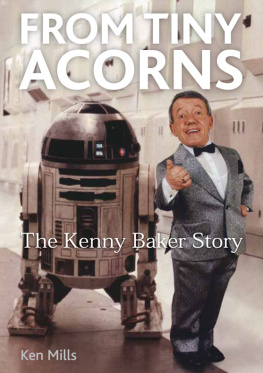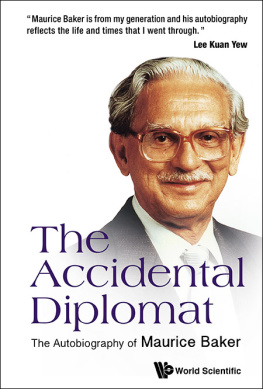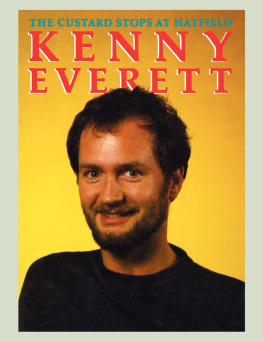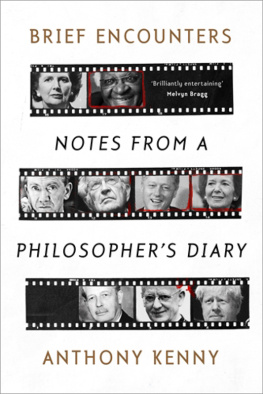Cover art: original color collage by Anna Neva, used by permission of the artist.
Different versions of portions of this book previously appeared in the following publications:
Angry Rain: A Brief Autobiographical Memoir from Boyhood to College
Contemporary Authors Autobiography Series 22. Detroit: Gale, 1995.
On Second Thought. Norman, OK: University of Oklahoma Press, 1995.
Published by
S TATE U NIVERSITY OF N EW Y ORK P RESS , A LBANY
2018 The estate of Maurice Kenny
All rights reserved. No portion of this manuscript may be reproduced orally or mechanically without permission of the authors estate.
Printed in the United States of America
E XCELSIOR E DITIONS IS AN IMPRINT OF S TATE U NIVERSITY OF N EW Y ORK P RESS
No part of this book may be used or reproduced in any manner whatsoever without written permission. No part of this book may be stored in a retrieval system or transmitted in any form or by any means including electronic, electrostatic, magnetic tape, mechanical, photocopying, recording, or otherwise without the prior permission in writing of the publisher.
For information, contact State University of New York Press, Albany, NY
www.sunypress.edu
Library of Congress Cataloging-in-Publication Data
Names: Kenny, Maurice, 19292016, author. | Maus, Derek C., editor.
Title: Angry rain : a brief memoir / Maurice Kenny; edited and with an introduction by Derek C. Maus.
Description: Albany : Excelsior Editions, an imprint of the State University of New York Press, [2018]
Identifiers: LCCN 2017049448 | ISBN 9781438471068 (paperback : alk. paper) | ISBN 9781438471075 (e-book)
Subjects: LCSH: Kenny, Maurice, 19292016. | Authors, American20 th centuryBiography. | Mohawk IndiansBiography.
Classification: LCC PS3561.E49 Z46 2018 | DDC 818/.5403 [B] dc23
LC record available at https://lccn.loc.gov/2017049448
10 9 8 7 6 5 4 3 2 1
For Lorne Simon
Whose life was cut short
Of all the words he stored
In his imagination
Few got to paper in time
In memory of
Diane Burns, Diane Decorah, Peter Blue Cloud, Fred Hoch, Mary Dickson, JP, Rose C., Cathy B., Ms. Gertrude, Randy Lewis, Joseph White, Lorraine Wilson, Manny Bernstein, Tim Jock
and especially my parents, Andy and Doris.
Introduction
As it turns out, Saint Petersburg in July is a great time and place to get editorial work done, especially when one is still dealing with jet lag after a transatlantic flight. I found this out during the summer of 2016 when I took advantage of the famed White Nights of that most literary of cities to work on finalizing the manuscript of the book you are holding in your hands. Although New Yorka city that Maurice Kenny knew quite well, as you will read in the recollections that followwas famously called the city that never sleeps, Saint Petersburgs midsummer version has a legitimate claim on the title as well. On each of my visits there, I have marveled that one can make do with only three or four hours of sleep a night.
I was in Saint Petersburg that summer to teach in an international summer-school programand had plenty of work to keep me busy in that contextbut I had also brought the manuscript of Maurices memoir with me to work on in my spare time, which is plentiful during the long days of the northern Russian summer. I recall with great fondness a particular sleepless night of editorial work in my rented fifth-floor apartment on Petrogradsky Island. The large windows of my preferred writing room overlooked the rooftops of the quarter both to the east and the west. As I passed a series of midnight hours with a frequently refreshed cup of tea and Maurices words displayed on my laptop, I hardly noticed as the twilight streaming through the windows subtly shifted from my left side to my right, dusk almost imperceptibly transforming into dawn. I am very much a night owl and have always enjoyed drifting off to sleep as songbirds greet the rising sun; however, when that phenomenon occurs at three in the morning and is not preceded by a stretch of recognizable night, there is something rather uncanny about it. The indeterminate mood stimulated by my surroundings proved quite fitting for working on a book that swings through a wide arc of emotions, from warmth and joy to recrimination and regret. When I had recited Maurices poem Wild Strawberries to a group of my Russian students, many of them remarked approvingly about his russkaia dushahis Russian souland that somewhat metaphysical association played in my mind as I worked through the pages of his text in my twilit aerie.
Maurice and I had spent a lot of time together since I first made his acquaintance, so a lot of the individual stories that make up this memoir are ones that I had heard from him before reading them again as his editor. Whether performing on a stage, sharing a dinner-table, or riding in a car, Maurice was an ardent and gifted storyteller. In his poetry and prose, he often writes about and adopts the voice of other people, animals, plants, and sometimes even spirits. In his private recollections, though, he generally told stories in which he featured prominently, whether or not he was their protagonist. With many people, such a reflexive focus might seem narcissistic or vain, but Maurice had already amassed seven decades of life experiences by the time I met him, so he legitimately had a lot of tales to tell. And what a life it was! My own gallivanting through the world seemed so tame compared to the multiple cross-continental journeys he took aboard a series of Greyhound buseshe suffered from severe claustrophobia that made flying an emotional ordealin order to read his words aloud in small towns and giant cities alike.
In the late summer of 2001, I had just moved to Potsdam, New York, where I had landed my first academic job at SUNY Potsdam. I spent the days before the start of the semester in my new office, unloading books and meeting my colleagues, one of whom turned out to be a Mohawk poet whose name had cropped up here and there during my undergraduate and graduate studies. After a brief initial meeting in the hallway, Maurice started regularly walking the fifty or so feet down from his office to linger at my open door. One wall of my office was adorned with a large poster that featured John Coltranes face, and during one of his visits Maurice tipped his chin toward the poster and casually mentioned that John and Alice used to live close to me when they first met, and Id talk to them out on the street a lot. Not long thereafter he told me the storyincluded in this memoir, of courseof how Orson Welles had whipped him off the running board of a hansom cab in Manhattan. I initially had my doubts about the veracity of some of these yarns, but they dissipated quickly. Although Maurice was certainly not above having a somewhat pliable memory about where, when, and in what order things happened, I learned that he never exaggerated when it came to the people he had met and known in his lifehe didnt need to.
I started to grasp the extent of his notable acquaintances when Maurice invited me to his apartment and showed mewith his characteristic mix of pride and self-consciousnesssome of the books that had been inscribed to him warmly and personally by their authors. I learned that Maurice had corresponded with, shared meals with, worked with, traveled with, lived with, and more than once fought with writers, actors, and artists that I had theretofore only known as names in anthologies, credits on a movie screen, or subjects on my doctoral exams. For a while, I would still jokingly chide him about dropping names when he mentioned his relationship with Amiri Baraka or Leslie Marmon Silko or Allen Ginsberg or Wendy Rose or Willard Motley or Simon Ortiz or Paddy Chayefsky or Audre Lorde or (you get the point, right?). After getting to know him better, though, I realized that he wasnt putting on airs by listing his famous friends. He spoke with the same vivacity and depth when telling stories about the lesser-known (at least to me ) writers whose work he helped bring forth as a publisher with













